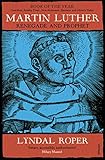Martin Luther : renegade and prophet / Lyndal Roper.
Publisher: London : The Bodley Head, 2016Description: xiii, 577 pages, 8 unnumbered pages of plates : illustrations, portraits.Content type: text | still image Media type: unmediated Carrier type: volumeISBN: 9781847920041.Subject(s): Luther, Martin, 1483-1546| Item type | Current library | Class number | Copy number | Status | Date due | Barcode | |
|---|---|---|---|---|---|---|---|
| Book | House of Lords Library - Palace Dewey | 920 LUT (Browse shelf(Opens below)) | 1 | Issued | 28/03/2024 | 012746 |
1. Mansfeld and Mining -- 2. The Scholar -- 3. The Monastery -- 4. Wittenberg -- 5. Journeys and Disputations -- 6. The Leipzig Debate -- 7. The Freedom of a Christian -- 8. The Diet of Worms -- 9. In the Wartburg -- 10. Karlstadt and the Christian City of Wittenberg -- 11. The Black Bear Inn -- 12. The Peasants' War -- 13. Marriage and the Flesh -- 14. Breakdown -- 15. Augsburg -- 16. Consolidation -- 17. Friends and Enemies -- 18. Hatreds -- 19. The Charioteer of Israel.
When on October 31, 1517 an unknown monk nailed a theological pamphlet to the church door in a small university town, he set in motion a process that helped usher in the modern world. Within a few years Luther's ideas had spread like wildfire. His attempts to reform Christianity by returning it to its biblical roots split the Western Church, divided Europe and polarised people's beliefs, leading to religious persecution, social unrest and war; and in the long run his ideas would help break the grip of religion on every sphere of life. Yet Luther was a deeply flawed human being: a fervent believer tormented by spiritual doubts; a prolific writer whose translation of the Bible would shape the German language yet whose attacks on his opponents were vicious and foul-mouthed; a married ex-monk who liberated human sexuality from the stigma of sin but who insisted that women should know their place; a religious fundamentalist, Jew-hater and political reactionary who called 'for the private and public murder of the peasants' who had risen against their lords in response to his teaching. And perhaps surprisingly, the man who helped create in the modern world was not modern himself: for him the devil was not a figure of speech but a real, physical presence.
